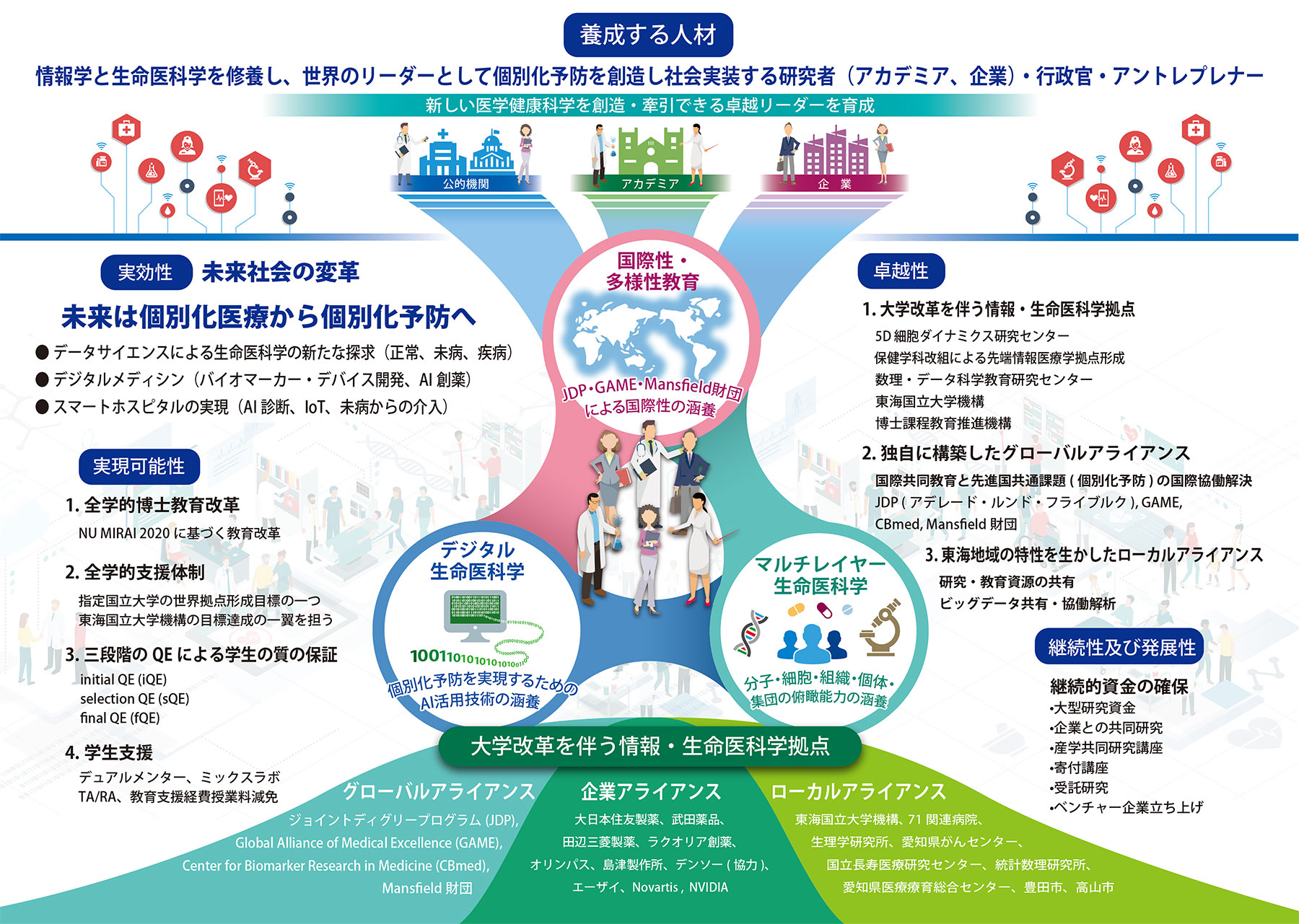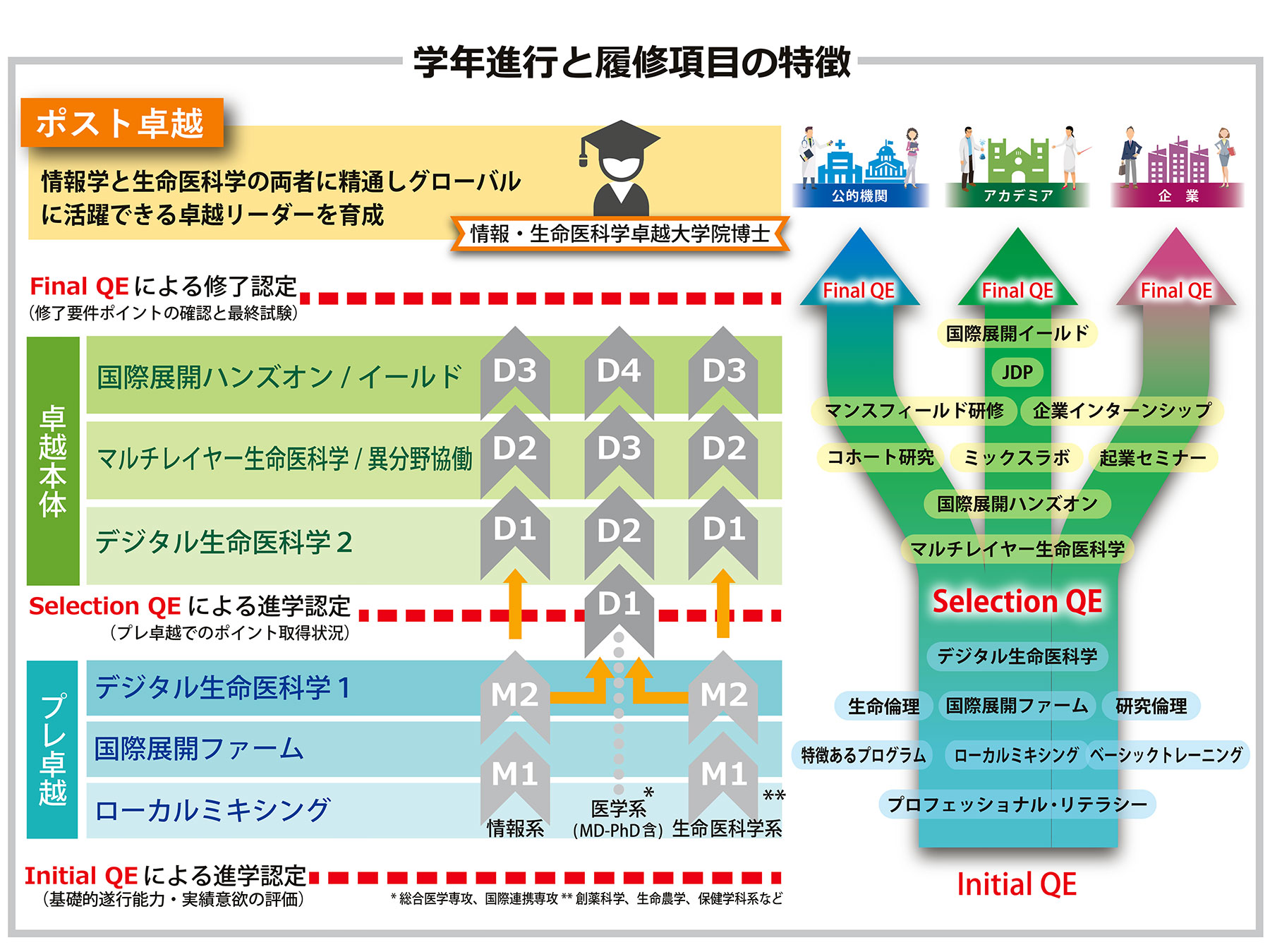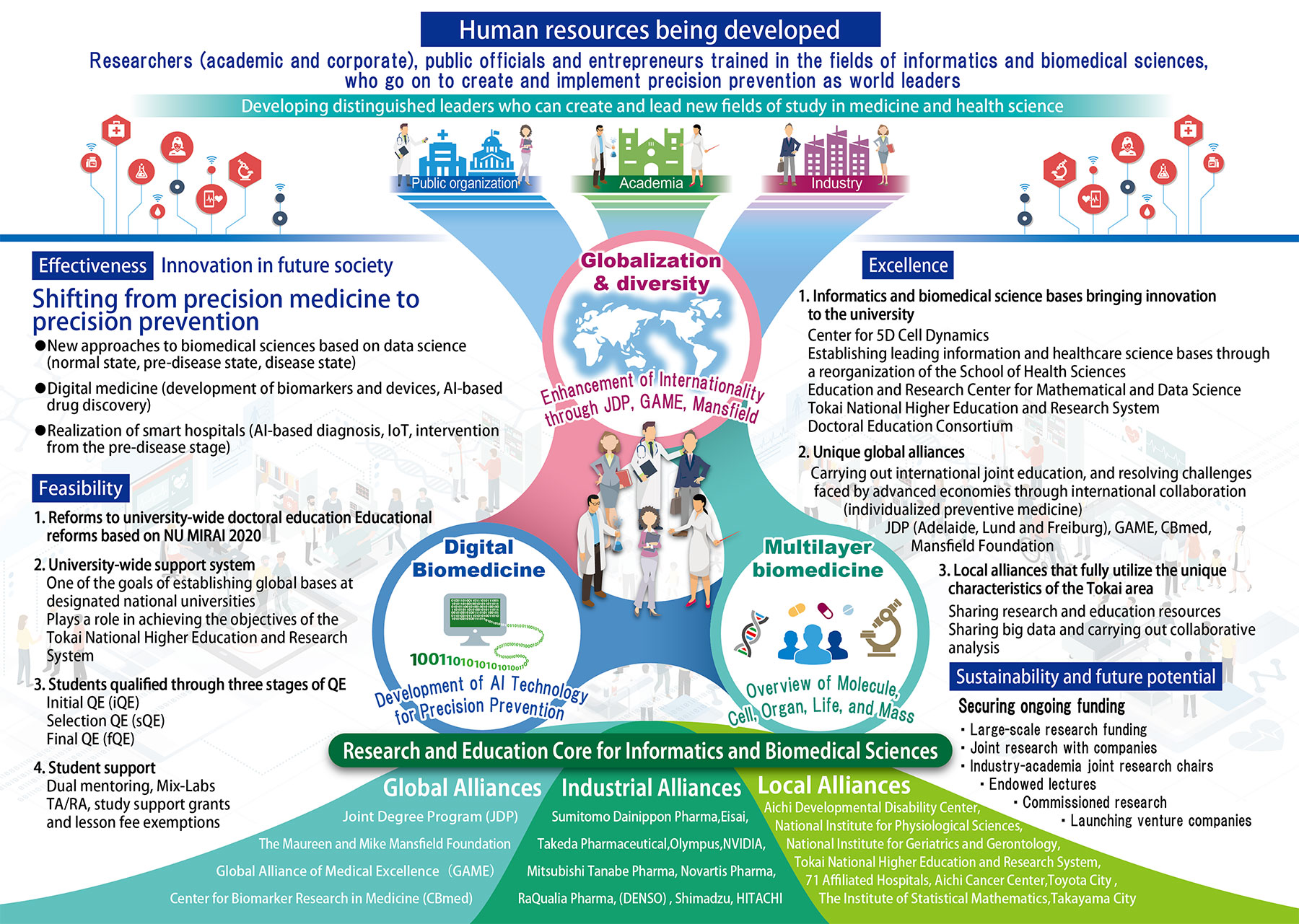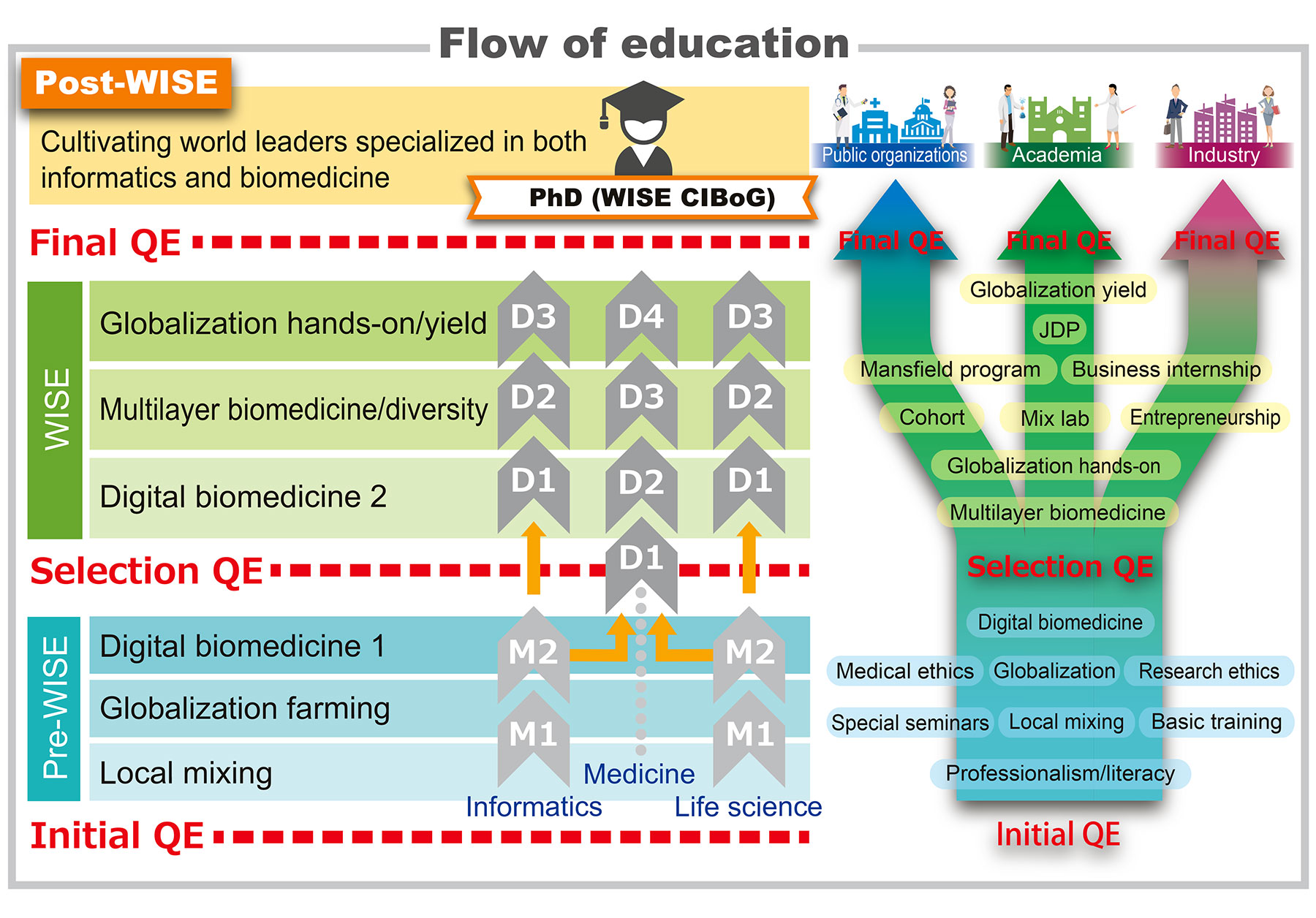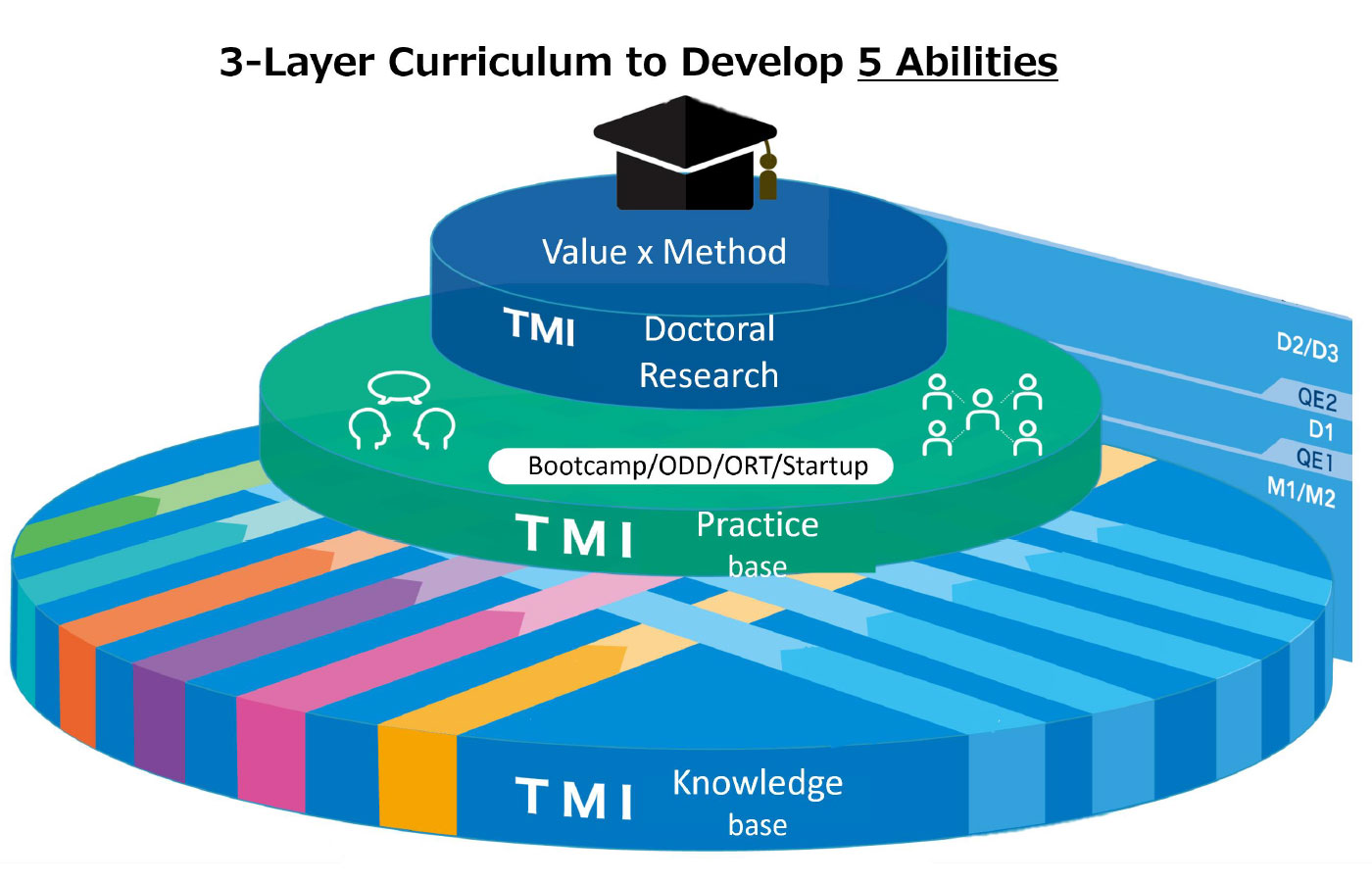海外の研究チームや産業界との
共同研究を重視する卓越大学院プログラム
卓越大学院プログラムは、文部科学省が2018年に導入した5年一貫の博士課程プログラムです。大学院生は、海外の研究チームや産業界との共同研究を通して、化学と生命科学、エレクトロニクスと機械工学、医療と情報科学のように複数の専門が融合する領域の研究に携わります。
プログラムの修了者は、あらゆるセクターを牽引できる卓越した能力を持った知のプロフェッショナルになることが期待されています。大学院生は、卓越したリーダーになるための企画力や統率力などの訓練にも研究と並行して参加します。例えば、プログラム参加者には、海外大学での研修、異なる専門の大学院生との協働、企業との共同研究、スタートアップ研修起業の訓練、海外インターンシップなどの機会が与えられます。大学の研究者だけでなく、有力企業の専門家との交流や協働が日常になります。
大学院生が研究と多様な能力の開発に打ち込めるようにするため、特別な経済的支援が用意され、さらに、TAやRAを通して指導能力を学び、追加の収入が得られるような仕組みが用意されています。
名古屋大学は、4つの採択プログラムを提供しています。
- DII
- 未来エレクトロニクス創成加速DII協働大学院プログラム(エレクトロニクス)
- GTR
- トランスフォーマティブ化学生命融合研究大学院プログラム(化学・生命科学の融合フロンティア)
- CIBoG
- 情報・生命医科学コンボリューションonグローカルアライアンス卓越大学院プログラム(情報・生命医科学)
- TMI
- ライフスタイル革命のための超学際移動イノベーション人材養成学位プログラム
名古屋大学の4つの卓越大学院における経済支援(内容は変更になる可能性があります。詳細は各プログラムへお問い合わせください。)
- DII
-
現在,経済支援は実施しておりません。
- GTR
-
現在,経済支援は実施しておりません。
- CIBoG
-
2026年度以降の経済支援は未定です。
- TMI
-
1~2年次(博士前期):月8万円程度(雇用)、3~5年次(博士後期):月18万円
-
 詳しくはこちら
詳しくはこちら
社会課題の解決につながる未来エレクトロニクスのイノベーションを加速するため、鍵となる3タイプの人材(Deployer, Innovator, Investigator: DII)を育成します。DIIが協力・協働することで、イノベーションを一気に加速します。
- Deployer : 革新的プロダクトによる社会価値創出を着想・企画 する人材
- Innovator : シーズから最終プロダクトを見通し、そこに至る技術課題を解決し、完遂する人材
- Investigator : 社会課題を理解し、高い洞察力に基づき解決策を提案する独創的な研究者

実践的なカリキュラム
社会課題発見ワークショップ (ニーズ発見)
分野を越えてグローバルに活躍する人材を育成するため、社会課題を認識し、マインドセットします。
プロダクト開発実習 (プロジェクトベーストラーニング)
大学や企業の経験豊富なDIIプログラム担当者のもと、プロダクトまでの一貫実験を行います。多様な技術がものづくりに関わっていることを実感し、 チーム協働やプロダクト実現までの道のりを実践します。
DII協働プロジェクト (社会還元)
DII協働を実体験し、その重要性を理解するための本プログラムで最も独創的な 取り組みです。DIIの異なるタイプを目指す履修生でチームを結成・協力して、 実社会における未来エレクトロニクスの課題に取り組みます。

プログラムコーディネータより
2017年12月、シリコンバレーで青色LEDでは発明からイノベーションに至るまで30年かかったという内容の講演をしたとき、著名な投資家の方から、“投資家は30年も待てない。10年が限度である。”というご指摘を頂きました。青色LEDを発明した学生の当時、研究者に加えて生産技術に長けた人、ビジネスに長けた人が近くに居て、共同でビジネスを興したら、ひょっとしたら10年でイノベーションができたかもしれない、というのがこのプログラムを考えるきっかけでした。
起業支援企業の方々にもご参加いただき、Deployer-Innovator-Investigatorを輩出するためのプログラムが出来上がりました。
起業も含めて三位一体で行うプログラムは、たぶん世界で初めてです。様々な世界的な問題解決のために、次世代のリーダーである皆さんが最先端の研究成果をいち早く社会実装を行う実践の場です。その皆さんのチャレンジを支えるのは、すでに社会で活躍しているDIIメンターであり、研究・開発・実用化を実際に体験するにはこれ以上ない環境と自信を持っております。世界初の試みDⅡ協働大学院プログラムで、是非皆さんの未来を切り開くとともに、世界貢献に挑戦してください。

プログラムコーディネータ: 天野浩
名古屋大学未来材料・システム研究所未 来エレクトロニクス集積研究センター教授。センター長。 2014年青色発光ダイオード(LED)を発明した業績に対し、ノーベル物理学賞受賞。
融合フロンティアを拓く研究者の育成
社会の持続的な発展には、環境・エネルギー問題の解決や、安定した食料生産、産業技術革新につながる物質創製、健康に資する生命科学など、克服すべき課題が多く、化学・生命科学研究の担う役割はますます重要となっています。こうした社会や科学が直面する問題にブレイクスルーを起こすには、それぞれの分野で既存の研究を発展させるにとどまらず、異なる分野間の融合領域を開拓し、新たな地平を切り拓く研究が必要です。そうした融合フロンティアを切り拓こうとする時に立ちはだかる、従来の学問分野の壁を乗り越え、研究を成し遂げるには、卓越した「研究突破力」が必要です。「研究突破力」は、魅力的かつ質の高い研究を自ら駆動し、成し遂げる研究によってこそ得られる経験、自信、実践力といったいわば"こえる力"と、自由闊達な議論で斬新な発想を生み出し問題を解決していく、異分野を"つなぐ力"の2つの要素からなります。
GTRプログラムでは、自ら発案する融合研究の提案、異分野環境での研究の実施、ダブルメンターによるきめ細やかな指導をもとに、従来の学問分野にとらわれない融合研究へ挑戦し、真の研究突破力を獲得する実践の場を提供します。

カリキュラム
基礎力養成カリキュラム
講義やセミナーを通して、質の高い先端研究のための高度な専門性と、異分野に踏み出すための幅広い知識を養う
研究総合力養成コース
研究提案やリトリート合宿などでの取り組みを通して、先見性、発想力、研究構想力、人ネットワーク力、国際性、挑戦心を磨く
研究突破力養成プログラム
海外協力機関や企業も含めた異分野研究環境(複数の研究室)でダブルメンターの指導を通して実施することで、従来の学問分野の壁を軽々と乗り越えて融合フロンティアを拓く「研究突破力」を身につける
- 分野 : 化学、生命科学
- キャリアパス : 国内外の大学、研究所、企業の研究者

多くの人が質の高い社会生活を営める新しい医療の構築を目指す
高齢化に伴うがんや認知症などの疾患の増加は途上国を含めた全世界的な社会問題ですが、超高齢化と少子化が顕著なわが国では特に深刻な問題です。多くの人が質の高い生活を営める高齢化社会を実現するために必要な新しい医療とは、これまでのように病気を早期に発見して治療をするだけでは無く、病気になることをあらかじめ予測して、予防のための処置を行うことにより、がんや認知症などの疾患を減少させるような新しい医療を目指すことが必要です。
現在では、生物学、社会行動学、生命医科学、人の遺伝子のデータバンクなど広範な分野に渡り膨大なデータバンクが集積されています。これらのビッグデータをより高度な情報処理技術により自由に取り出して、個々人が病気になる前の状態を検知して最適な予防をすること(個別予防)は近い将来の必然でもあります。このような新しい医療の構築を実現するには、情報学と生命医科学が一体となった研究を進める必要があります。これを実現する為に、名古屋大学の情報学研究科、創薬科学研究科、生命農学研究科、医学系研究科が連携すると共に、地域の4研究機関と岐阜大学も加えた一大研究拠点を形成し、個別予防を目指す研究を強力に推進します。これらの先端的研究を実社会に反映させる為に製薬関係を始めとする12の企業、世界の9大学とも連携してグローバルな展開を図ります。
情報学と生命医科学に精通した国際的人材の育成
情報学と生命医科学に精通し、国際的に活躍できる博士人材を育成する為の5年一貫教育を実施します。対象となる専攻に入学した学生の中から応募者を募ります。所属専攻の課程に加え、プログラムが設定した情報学、生命医科学の講義科目の習得が必要です。また、英語研修、国際会議への出席、海外の連携大学への留学、企業との共同研究などの国際的かつ多様な経験も可能です。
「移動」を通じてライフスタイル革命の実現に貢献する人材の養成
近年の「移動革命」とも呼ばれる技術革新は、時間・空間の移動コストを最小化する産業革命以来の社会変革を創出していますが、社会課題が複雑化し、さらに価値基準も多様化する中で、技術先導型の「豊かなライフスタイルの実現」は困難になりつつあります。ライフスタイル革命の牽引には、人文・社会科学、工学、情報学、環境学などの異分野(Multidisciplinary)の専門家でチームを組み、互いの専門を理解・尊重しつつ、ライフスタイルの多様な「価値を創造」し、その「技術・方法論」の構築により社会への橋渡し(Translation)が可能な、超学際的(Transdisciplinary)な人材が必要です。
本プログラムでは、本学が民間企業と共に取組む産学共創教育に加え、6研究科・7センターが相互の力を結集して専門家チームによる超学際協働力を涵養する卓越したカリキュラムを構造化しています。これにより「移動」を豊かな方向性をもった社会的価値に昇華する取組に貢献できる「超学際移動イノベーション人材」を養成します。

3階層の超学際型カリキュラムによる知識と経験の蓄積
本プログラムでは、超学際協働による移動イノベーション(以下TMI: Transdisciplinary Mobility Innovation)を行うために必要な知識と実践を、3階層の超学際型カリキュラムとして構造化しています。
もっとも基礎となる「TMI知識基盤」は、履修生の基礎に応じて選択でき、専門分野を学ぶ縦糸系科目と、異なる分野を繋ぐ横糸系科目により、超学際協働に必要な基盤知識を学ぶ「縦糸・横糸型コースワーク」、異分野教員間の異なる視点を学ぶ「超学際教員討論型講義」、移動に関する基盤知識を学ぶ「移動イノベ共通講義」から構成されています。「TMI実践基盤」は、合宿形式での緊密なチーム型連携により超学際協働力を涵養する「ブートキャンプ」、自治体などの現場に行き、調査研究を行うORT (On-site Research Training)、実証実験の基盤となる「テストベッド」を企業メンターと共に学内外に協働で設計・開発するTDD (Testbed Design and Development)、履修生間でチームを組みベンチャー設立を企画・実践する「起業実践」から構成されています。「TMIライフスタイル革命博士研究」では、自らの専門分野に加え、産学共創研究など、超学際協働に基づくライフスタイル革命における「価値創造」と「方法論」に着目した博士論文研究を実施します。特に、本学が推進する「産学共創教育」では、民間企業との共同研究を通じ「知のプロフェッショナル」としての力を養います。
WISE Program (Doctoral Program for World-leading Innovative & Smart Education)
Promoting Joint Research with Overseas Research Teams and Industrial Sector
The WISE Program (Doctoral Program for World-leading Innovative & Smart Education) is an integrated five-year program introduced by the Ministry of Education, Culture, Sports, Science and Technology in 2018. The program allows postgraduate students to become involved in interdisciplinary research in fields such as chemistry and biomedical sciences, electronics and mechanical engineering, or medicine and information science, through joint research with overseas research teams and the industrial sector.
Students who complete the program can expect to become highly-skilled knowledge professionals capable of playing leading roles in a wide range of sectors. Alongside their regular research activities, postgraduate students undertake training to become outstanding leaders, including planning and leadership skills training. For example, program participants are given opportunities to take part in training at overseas universities, to collaborate with postgraduate students from different specialisms, to carry out joint research at companies, to undertake startup training on entrepreneurial apprenticeships, and to carry out overseas internships. As well as working with university researchers, they enjoy interacting with and working alongside experts at leading companies on a regular basis.
Special financial support has been put in place to support graduate students as they go about their research activities and develop a diverse range of skills. Systems have also been developed to help students acquire teaching skills and obtain additional income through the TA and RA programs.
Nagoya University offers four WISE programs
- DII
-
Collaborative Graduate Program for Accelerating Innovation in Future Electronics
(electronics)
- GTR
-
Graduate Program of Transformative Chem-Bio Research
(on the frontier of interdisciplinary chemistry and life sciences)
- CIBoG
-
Convolution of Informatics and Biomedical Sciences on Global Alliances
(informatics and biomedical sciences)
- TMI
- Graduate Program for Lifestyle Revolution based on Transdisciplinary Mobility Innovation
Financial support at four WISE programs at Nagoya University (Subject to change, please contact the Program for details.)
- DII
-
No financial support is currently available.
- GTR
-
No financial support is currently available.
- CIBoG
-
Financial support for FY2026 and beyond has not yet been determined.
- TMI
-
Examples: first to second year students (master’s courses): 80,000 yen per month;
third to fifth year doctoral students: 180,000 yen per month. -
 LEARN MORE
LEARN MORE
DII
Collaborative Graduate Program for
Accelerating Innovation in Future Electronics
Completing 30-year innovation in ten years
-Training to be doctoral graduates with an understanding of business-
In order to accelerate innovation in future electronics, which will provide solutions for the problems facing society, we cultivate three types of key human resources (Deployers, Innovators, and Investigators: DII).
Innovation accelerates exponentially when these DII cooperate and work with one another.
- Deployer : Deployers conceive of and plan the creation of social value through innovative products
- Innovator : Innovators consider the route from seeds through to the final product, resolve the technological challenges, and complete the product
- Investigator : Investigators are creative researchers who understand the social challenges and propose solutions based on their strong insights
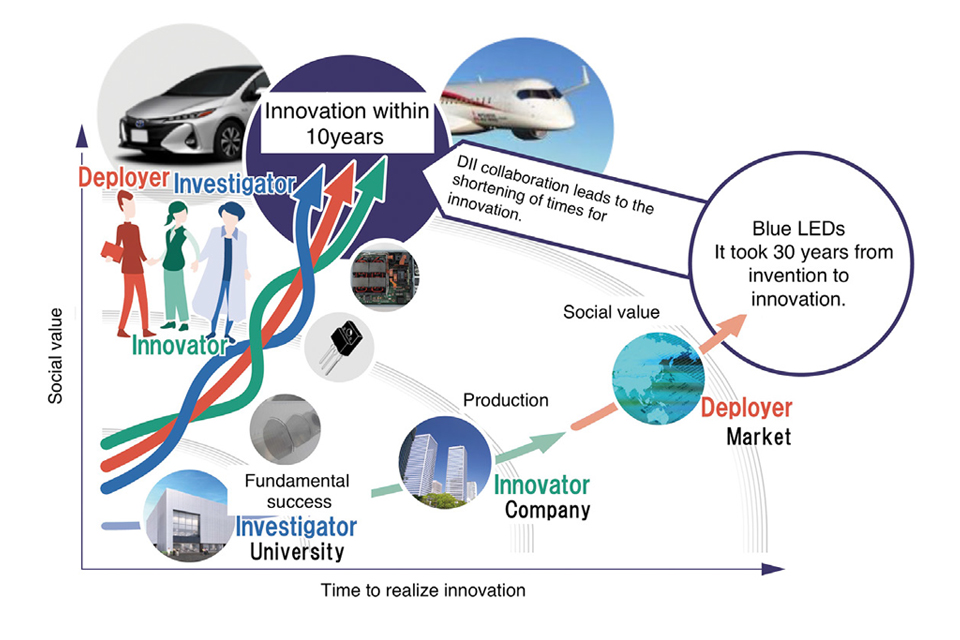
A Practical Curriculum
Finding Social Challenges workshops (discovering needs)
We identify social challenges and establish the right mindset to for developing human resources capable of global careers spanning multiple disciplines.
Product development training (project-based learning)
Program participants carry out experiments through to the final product under the guidance of highly-experienced DII program teachers from universities or companies. They gain a sense of involvement in manufacturing using diverse technologies. In addition, they practice working in teams and following the path to product realization.
DII collaboration project (giving back to society)
This gives participants first-hand experience and understanding of the importance of DII collaboration. It is the most creative initiative of the program. Students aiming to become different types of DII form teams and work together to take on future electronics challenges in the real world.

Message from Program Coordinator
After giving a speech in Silicon Valley in December 2017 and explaining that the blue light-emitting diodes (LEDs) took thirty years from invention through to innovation, a famous investor pointed out that investors can’t wait thirty years, and that the most they will wait is around ten years. When I invented blue light-emitting diodes as a student, in addition to researchers, I was surrounded by people with a lot of experience in production technology and business. We thought it might be possible to achieve innovation in around ten years if we embarked upon a business together. This experience was what led to the creation of the DII program.
Employees from companies that wish to support entrepreneurship also take part in the program, and we have created a program that produces Deployers, Innovators and Investigators.
This is probably the first tri-sectoral program in the world to be carried out in a way that also involves entrepreneurs. It provides opportunities for students as next-generation leaders to put cutting-edge research results into practice in the real world rapidly, so that we can find solutions to a variety of global problems. It is the DII mentors, who already have real world experience, who support our students as they take on this challenge. We are confident that nowhere else has a better environment in terms of practical research experience, development and commercialization. The DII program is a world first attempt, so why not take on the challenge of making a global contribution that will open up a new future for everyone?

Program Coordinator: Hiroshi Amano
Professor and Director of the Center for Integrated Research of Future Electronics, Institute of Materials and Systems for Sustainability, Nagoya University; he was awarded the Nobel Prize for Physics in 2014 for inventing blue light-emitting diodes (LEDs).
GTR
Graduate Program of
Transformative Chem-Bio Research
Pioneering interdisciplinary frontiers and creating the future knowledge
Foster researchers who can pioneer an interdisciplinary frontier
In order to achieve sustainable development of society, many challenges must be overcome, including environmental and energy problems, stable food production, the development of materials leading to industrial and technological innovations, and life science research that contributes to health. To breakthrough these issues, both advances in research in each field and promotion of interdisciplinary research is necessary. To bridge the gaps between traditional disciplines, we need to achieve outstanding "research breakthrough power," which consists of two elements: the ability to overcome obstacles and the ability to connect.
The GTR program provides a practical course for acquiring these important research capabilities through challenging and exciting interdisciplinary research in diverse research environments in which each student benefits from the guidance of two mentors.
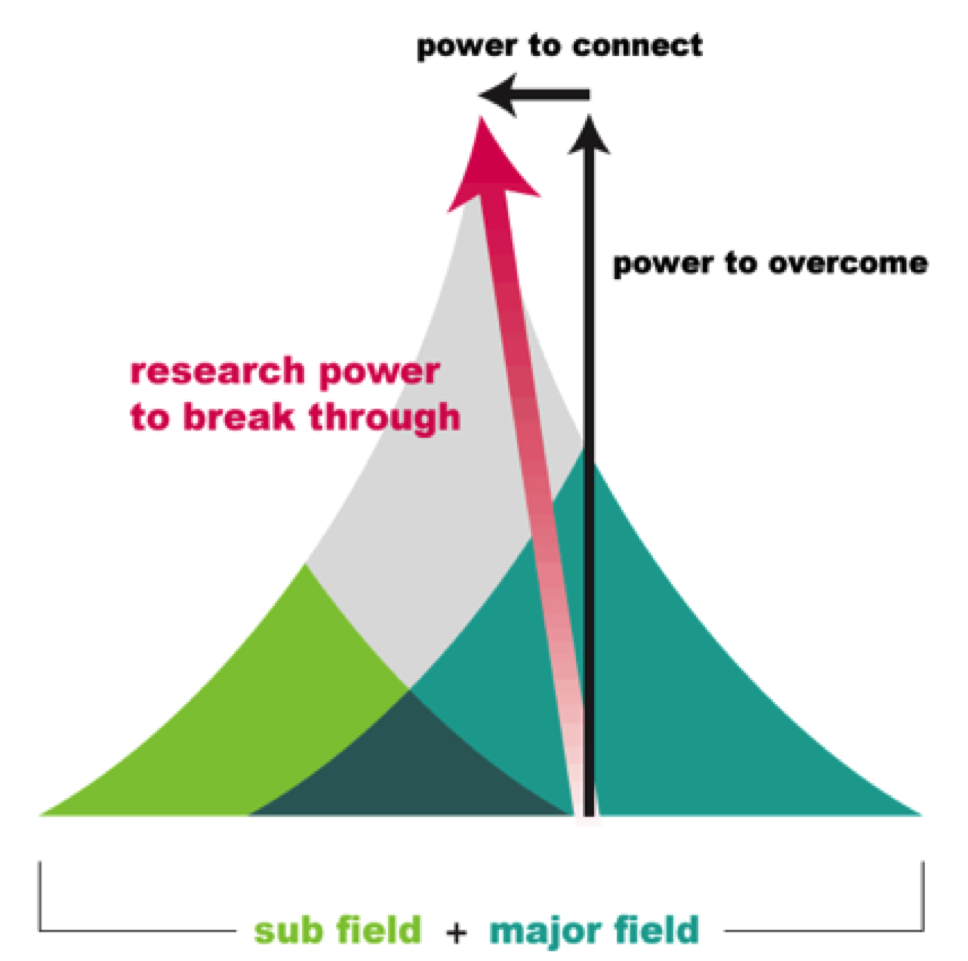
Curriculum Outline
Curriculum for developing the foundational strengths
The curriculum cultivates a high degree of expertise in carrying high-quality, cutting-edge research and abroad range of knowledge for launching into different fields of study.
Course for cultivating comprehensive research power
The course cultivates foresight, the power of independent thought, research creativity, the power to develop personal connections and human networks, an international perspective, and a willingness to take on new challenges
Program for developing research power to achieve breakthroughs
The program cultivates research power to achieve breakthroughs, which is the power to easily cross the boundaries of conventional disciplines and advance interdisciplinary frontiers.
- Field : Chemistry and Life Science
- Prospective Career : Researcher in company, research institution or university

CIBoG
Convolution of Informatics and
Biomedical Sciences on Global Alliances
From individualized treatment to individualized preventive medicine
Aiming to build new medicine offering high quality social lives for large numbers of people
The increasing prevalence of age-related diseases such as cancer and dementia is a social challenge facing the whole world, including developing countries. However, it is a particularly serious problem in Japan, which has a super-aged society and a noticeably low birthrate. In order to achieve the new healthcare that will be needed to realize an aged society in which large numbers of people enjoy high quality lives, we need to aim for a new type of healthcare that reduces diseases such as cancer and dementia by predicting illness in advance and carrying out preventive measures, rather than the current approach of detecting illness at an early stage and then treating it.
Today, vast data banks have been accumulated across extensive fields, including biology, social behavior studies, biomedical science, and human genetics. In the near future, it is inevitable that we will be able to freely access this big data through advanced information processing technology, to detect conditions before an individual becomes ill, and to implement the best preventive measures (individualized prevention). In order to successfully build this type of new healthcare, we need to carry out research that combines informatics and biomedical sciences. To make this a reality, with cooperation from Nagoya University’s Graduate School of Informatics, Graduate School of Pharmaceutical Sciences, Graduate School of Bioagricultural Sciences and Graduate School of Medicine, we have built a large research base along with four regional research centers and Gifu University, and we are working hard to promote research into individualized prevention. To reflect this cutting-edge research in real society, we will develop the system globally, in collaboration with ten companies, including twelve pharmaceutical companies, and nine global universities.
Developing global human resources with expert knowledge of informatics and biomedical sciences
CIBoG provides an integrated five-year education program to foster doctoral human resources possessing expert knowledge of informatics and biomedical sciences and the ability to work in global settings. It attracts applicants from students enrolling at the university in eligible major subjects. In addition to their specialist subjects, students need to take lecture courses in informatics and biomedical sciences for which programs have been established. The program also provides international and diverse experiences, including English language study, attendance at international conferences, exchange studies at overseas partner universities, and opportunities for joint research at companies.
TMI
Graduate Program for Lifestyle Revolution based on
Transdisciplinary Mobility Innovation
What are the really abundant lifestyles?
How do you create these values and realize them?
Development of talents who contribute to realize Lifestyle Innovation with “Mobility Innovation”
In recent years, technological innovation also known as "mobility revolution" has created social change since the Industrial Revolution that minimizes the cost of traveling in time and space. However, as social issues become more complex and value standards diversify, technology-led "realization of rich lifestyles" is becoming difficult. To drive lifestyle revolution, transdisciplinary human resources are required to team up with experts from different fields (multidisciplinary) such as humanities, social sciences, engineering, informatics, and environmental science, to understand and respect each other's specialties, to create diverse values (value creation) for lifestyle, and to translate those values to society by building the "technology and methodology".
In this program, in addition to "Industry-Academia Co-Creation Education" in which the university collaborates with private companies, 6 graduate schools and 7 centers are structuring an outstanding curriculum that cultivates transdisciplinary collaboration by expert teams. In this way, we will train "Transdisciplinary Mobility Innovation (TMI) human resources" who can contribute to efforts to create "mobility" with high social values.
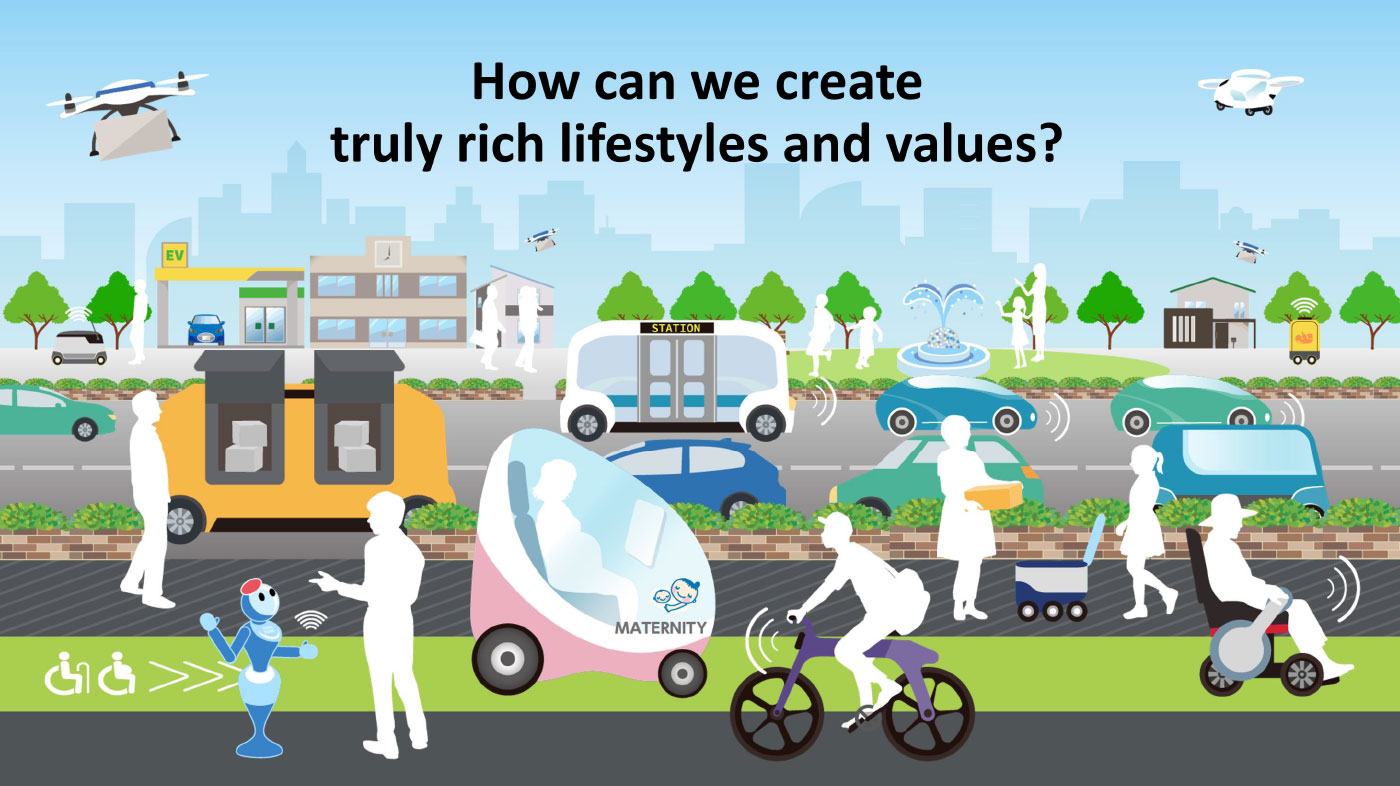
Accumulation of knowledge and experiences through three-layered transdisciplinary curriculum
In this program, the knowledge and practice necessary for conducting Transdisciplinary Mobility Innovation (TMI) through transdisciplinary collaboration is structured as a 3-layer transdisciplinary curriculum. The most basic "TMI Knowledge Base" can be selected according to the backgrounds of the students, and consists of: "Course Works" in which basic knowledge necessary for transdisciplinary collaboration is learned through courses in specialized fields and courses in multidisciplinary fields that connect different fields, "Transdisciplinary Faculty Discussion Lecture" to learn different viewpoints from lecturers in different fields, and "Mobility Innovation Common Lectures" to learn basic knowledge about mobility. The "TMI Practice Base" consists of: "Boot Camp" that fosters transdisciplinary collaboration through close team-type collaboration in a training camp format, "On-site Research Training (ORT)" in which site surveys are conducted on sites such as local governments, "Testbed Design and Development (TDD)" in which students collaborate with corporate mentors to design and develop a "testbed" as a basis of demonstration experiments, and "Venture Catapult" through which students plan and practice the establishment of a venture by forming a team among students. In "TMI Lifestyle Revolution Doctoral Research", in addition to a student's own specialized field, students conduct doctoral dissertation research focusing on "value creation" and "methodology" in lifestyle revolution based on transdisciplinary collaboration such as industry-academia co-creation research. In particular, in the "Industry-Academia Co-Creation Education" promoted by the university, "intellectual professional" ability will be cultivated through joint research with private companies.

